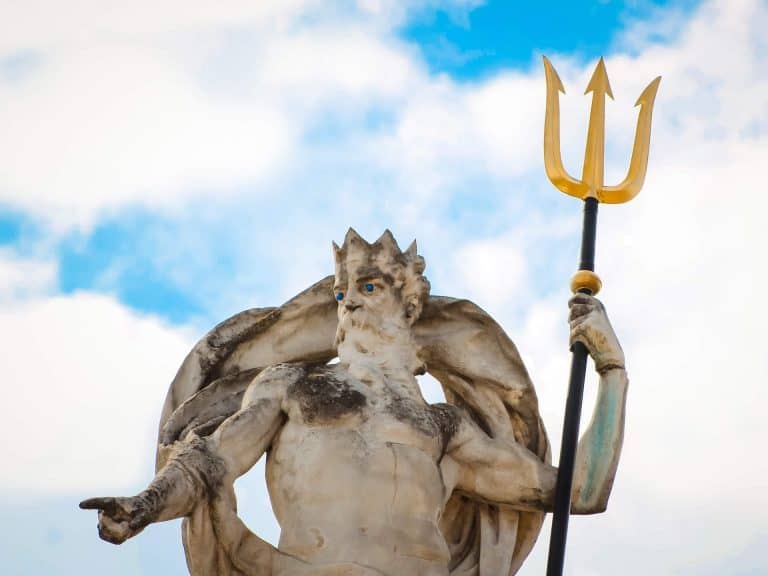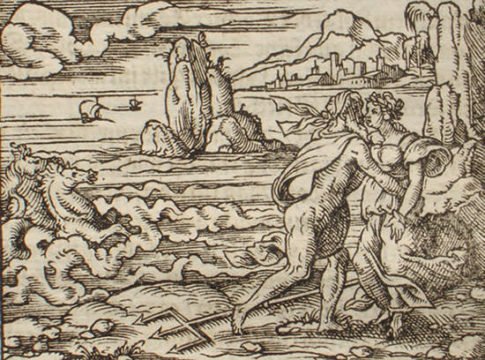
As the sea surrounds and holds the earth, he himself is described as the god who holds the earth ( γαιήοχος, gaiēochos), and who has it in his power to shake the earth ( ενοσίχθων, enosichthōn, κινητὴρ γᾶς, kinētēr gas). 23īeing the ruler of the sea (the Mediterranean), he is described as gathering clouds and calling forth storms, but at the same he has it in his power to grant a successful voyage and save those who are in danger, and all other marine divinities are subject to him.

22 In the Odyssey, Poseidon appears hostile to Odysseus, whom he prevents from returning home in consequence of his having blinded Polyphemus, a son of Poseidon by the nymph Thoosa. 21 When Zeus permitted the gods to assist whichever party they pleased, Poseidon joining the Greeks, took part in the war, and caused the earth to tremble he was opposed by Apollo, who, however, did not like to fight against his uncle.
:max_bytes(150000):strip_icc()/poseidon-and-mermaid--north-east-coast-of-zakynthos-or-zante-island--ionian-sea--greece--1076046026-5c2d248546e0fb00015078cc.jpg)
19 For this reason Poseidon like Hera bore an implacable hatred against the Trojans, from which not even Aeneas was excepted, 20 and took an active part in the war against Troy, in which he sided with the Greeks, sometimes witnessing the contest as a spectator from the heights of Thrace, and sometimes interfering in person, assuming the appearance of a mortal hero and encouraging the Greeks, while Zeus favored the Trojans. 17 When Poseidon and Apollo had built the walls of Troy, Laomedon refused to give them the reward which had been stipulated, and even dismissed them with threats 18 but Poseidon sent a marine monster, which was on the point of devouring Laomedon's daughter, when it was killed by Heracles. 16 Accordingly, although he was otherwise well disposed towards the Greeks, yet he was jealous of the wall which the Greeks built around their own ships, and he lamented the inglorious manner in which the walls erected by himself fell by the hands of the Greeks. Poseidon in conjunction with Apollo is said to have built the walls of Troy for Laomedon, 15 whence Troy is called Neptunia Pergama. 13 But although he generally dwelt in the sea, still he also appears in Olympus in the assembly of the gods. 12 Generally he himself put his horses to his chariot, but sometimes he was assisted by Amphitrite. With these horses he rides in a chariot over the waves of the sea, which become smooth as he approaches, and the monsters of the deep recognize him and play around his chariot. The palace of Poseidon was in the depth of the sea near Aegae in Euboea, 11 where he kept his horses with brazen hoofs and golden manes. 8 Hence we find him angry when Zeus, by haughty words, attempts to intimidate him nay, he even threatens his mightier brother, and once he conspired with Hera and Athena to put him into chains 9 but, on the other hand, we also find him yielding and submissive to Zeus. In the earliest poems, Poseidon is described as indeed equal to Zeus in dignity, but weaker. According to others, again, he was brought up by the Telchines at the request of Rhea. 5 According to Tzetzes 6 the nurse of Poseidon bore the name of Arne when Cronus searched after his son, Arne is said to have declared that she knew not where he was, and from her the town of Arne was believed to have received its name. A well in the neighborhood of Mantineia, where this is said to have happened, was believed, from this circumstance, to have derived the name of the "Lamb's Well," or Arne. 4 According to others, he was concealed by Rhea, after his birth, among a flock of lambs, and his mother pretended to have given birth to a young horse, which she gave to Cronus to devour.


Like his brothers and sisters, he was, after his birth, swallowed by his father Cronus, but thrown up again. 2 He was accordingly a brother of Zeus, Hades, Hera, Hestia and Demeter, and it was determined by lot that he should rule over the sea. 1 He was a son of Cronus and Rhea, whence he is called Kronios ( Κρόνιος) and by Latin poets Saturnius. His name seems to be connected with πότος ( potos), πόντος ( pontos), and ποταμός ( potamos), according to which he is the god of the fluid element.


 0 kommentar(er)
0 kommentar(er)
